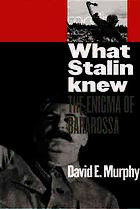Table Of ContentWhat Stalin Knew
What Stalin
Knew
the
Enigma of
Barbarossa
David E. Murphy
Yale University Press New Haven & London
Copyright ∫ 2005 by David E. Murphy.
All rights reserved.
This book may not be reproduced, in whole or in part, including illustrations, in any form
(beyond that copying permitted by Sections 107 and 108 of the U.S. Copyright Law and
except by reviewers for the public press), without written permission from the publishers.
Designed by James J. Johnson and set in New Aster type by Keystone Typesetting, Inc.
Printed in the United States of America by Vail-Ballou Press.
Library of Congress Cataloging-in-Publication Data
Murphy, David E., 1921–
What Stalin knew : the enigma of Barbarrosa / David E. Murphy.
p. cm.
Includes bibliographical references and index.
ISBN 0-300-10780-3 (cloth : alk. paper)
1. World War, 1939–1945—Campaigns—Eastern Front. 2. Stalin, Joseph, 1879–1953—
Military leadership. 3. Soviet Union—Politics and government—1936–1953. I. Title.
D764.M845 2005
940.54%217—dc22
2004065916
A catalogue record for this book is available from the British Library.
The paper in this book meets the guidelines for permanence and durability of the
Committee on Production Guidelines for Book Longevity of the Council on Library
Resources.
10 9 8 7 6 5 4 3 2 1
For my wife, Star
In the early 1920s, Stalin and a few colleagues were relaxing in
Morozovka Park, lying in the grass. One asked: ‘‘What’s the best
thing in the world?’’ ‘‘Books,’’ replied one. ‘‘There is no greater
pleasure than a woman, your woman,’’ said another. Then Stalin
said, ‘‘The sweetest thing is to devise a plan, then, being on the alert,
waiting in ambush for a goo-oo-ood long time, finding out where the
person is hiding. Then catch the person and take revenge!’’
—MIKLOS KUN, Stalin: An Unknown Portrait
Contents
Acknowledgments ix
Sources xi
Introduction: Stalin’s Absolute Control, Misconceptions, and
Disastrous Decisions xv
Abbreviations and Acronyms xxi
CHAPTER 1Stalin versus Hitler: Background 1
CHAPTER 2The Outspoken General: Ivan Iosifovich Proskurov 7
CHAPTER 3Proskurov Sets Stalin Straight 14
CHAPTER 4Soviet Borders Move Westward 29
CHAPTER 5The Finns Fight: Proskurov Made a Scapegoat 47
CHAPTER 6Soviet Military Intelligence Residencies in
Western Europe 62
CHAPTER 7Soviet Military Intelligence Residencies in
Eastern Europe 71
CHAPTER 8Who Were You, Dr. Sorge? Stalin Never Heard of You. 84
viii CONTENTS
CHAPTER 9NKVD Foreign Intelligence 91
CHAPTER 10Fitin’s Recruited Spies 97
CHAPTER 11Listening to the Enemy 108
CHAPTER 12Working on the Railroad 117
CHAPTER 13The Border Troops Knew 124
CHAPTER 14Proskurov Is Fired 137
CHAPTER 15Golikov and Operation Sea Lion 145
CHAPTER 16‘‘We Do Not Fire on German Aircraft in Peacetime’’ 162
CHAPTER 17German Deception: Why Did Stalin Believe It? 173
CHAPTER 18Secret Letters 185
CHAPTER 19The Purges Revived 192
CHAPTER 20On the Eve 204
CHAPTER 21A Summer of Torture 216
CHAPTER 22The Final Reckoning 232
Conclusion: Will the Future Be a Repeat of the Past? 245
Appendix 1: Organization and Functions of Soviet Military
Intelligence 253
Appendix 2: Hitler’s Letters to Stalin 256
Appendix 3: Those Executed without Trial on October 28, 1941 259
Appendix 4: Chronology of Agent Reporting 261
Glossary of Spies and Their Masters 264
Notes 275
Index 301
Acknowledgments
This book is the result of a suggestion by Jonathan Brent, editorial director
of Yale University Press, who first brought to my attention the extensive
collection of archival documents on Soviet intelligence being assembled
by Aleksandr N. Yakovlev and members of his International Democracy
Foundation in Moscow. Brent felt it would be a valuable contribution to an
understanding of the events leading up to the German invasion of the
USSR on June 22, 1941, if I, as a career intelligence officer, were to exam-
ine how the Soviet intelligence services functioned at that time and how
Stalin reacted to the information they provided on the German threat.
From the outset, Jonathan Brent and his staff at Yale University Press were
unstinting in their support of my efforts. Special thanks to my copy editor,
Roslyn Schloss, whose herculean work transformed this text.
My research has greatly benefited from the advice and assistance of
friends and colleagues in the United States who brought to my attention
publications on this subject. Robert Tarleton made available to me mate-
rial from his own extensive library, as did Harriet Scott, who continues to
follow Russian military affairs. My old friend William J. Spahr, Zhukov’s
biographer, was always ready to respond to my questions. Another friend,
Hayden B. Peake, now curator of the CIA Historical Collection, encour-
aged me in my work, as did CIA historians Kevin C. Ruffner, Donald P.
Steury, and Michael Warner. Serge Karpovich, a former colleague and
longtime friend, was most helpful in housing me in Moscow, introducing

